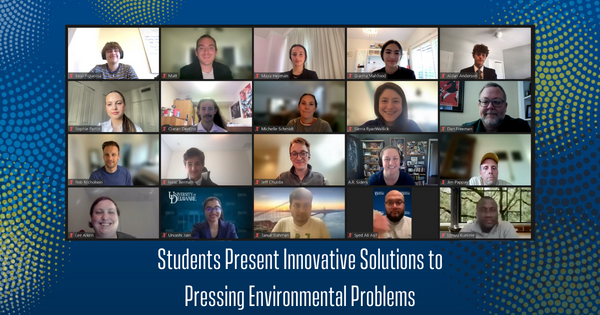 12 student teams spent Saturday, October 22, presenting possible solutions to ecological challenges in the Fall 2022 Eco Design Sprint, sponsored by the Ratcliffe Eco-Entrepreneurship Fellows program (REEF@UD), Horn Entrepreneurship, and the Gerard J. Mangone Climate Change Science and Policy Hub at the University of Delaware. Winning proposals ranged from enhanced artificial turf to non-heat absorbing sidewalks to delayed-release nitrogen fertilizers.
12 student teams spent Saturday, October 22, presenting possible solutions to ecological challenges in the Fall 2022 Eco Design Sprint, sponsored by the Ratcliffe Eco-Entrepreneurship Fellows program (REEF@UD), Horn Entrepreneurship, and the Gerard J. Mangone Climate Change Science and Policy Hub at the University of Delaware. Winning proposals ranged from enhanced artificial turf to non-heat absorbing sidewalks to delayed-release nitrogen fertilizers.
Each track had judges working in areas related to the problem, including Geothermal Energy Scheduling Manager, a US naval officer, a Social Entrepreneur, an official from the Delaware Center for the Inland Bays, an engineer from the Delaware Department of Transportation, an official from DE’s Department of Natural Resources & Environmental Control, and UD faculty.
While judges deliberated, Horn’s Director of Commercialization Mike Rinkunas highlighted resources at UD and across the ecosystem that participants can use to continue developing entrepreneurial solutions to environmental problems, in addition to the class he co-teaches as the core of the REEF@UD program, the Eco-Entrepreneurship Practicum, offered this spring.
But whether students will be continuing in Eco-Entrepreneurship or not, Horn Entrepreneurship Director Dan Freeman said all Eco Design Sprint participants got the benefit of learning and practicing entrepreneurial thinking.
“For the students, it is an opportunity to engage in real-world, creative problem-solving. It at least allows them to discover whether this is something they’re interested in,” Freeman said. “When you think about the core of entrepreneurship education, it is helping to develop the mindset, the skill sets, and access to resources so people can engage in creative problem-solving when they notice problems and are predisposed to do that. It is giving people efficacy and agency to engage problems. Entrepreneurship education is about much more than just starting new businesses.”
At the end of the day, following pitches of a total of 12 proposals, winners and runners-up were selected for each track. Students on the winning teams split $1,000 in prize money, and runners-up split $500. Everyone who completed the entire day received a $25 gift card.
While not all ideas from the Eco Design Sprint will go on to be developed further, the judges in all tracks emphasized how impressed they were by the students’ thinking. Freeman said the focus was on recruiting students with an environmental interest, helping them develop entrepreneurial tools, and making them aware of how UD empower them in changing the world.
Eco Design Sprint Winners
Track 1 — Combating extreme heat in urban environments
- Winner: Therm Turf - Sophie Whiteside, Anaya Shintre, Maya Heyman, Gaby Frei
- Runner-Up: Sidewalk Sunblock - Isaac Berman, Lee Staller, Gabriela (Gabi) Guimaraes, Jake Julien
Track 2 — Ending waste entering the oceans.
- Winner: Minimizing Agricultural Runoff Waste - Bear Figueroa
- Runner-up: The O Cleaner - Catherine Osinubi
About Horn Entrepreneurship
Horn Entrepreneurship serves as the creative engine for entrepreneurship education and advancement at the University of Delaware. Currently ranked among the best entrepreneurship programs in the US, Horn Entrepreneurship was built and is actively supported by successful entrepreneurs, empowering aspiring innovators as they pursue new ideas for a better world.

